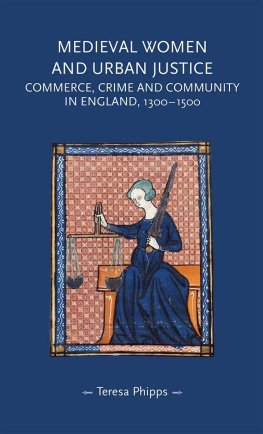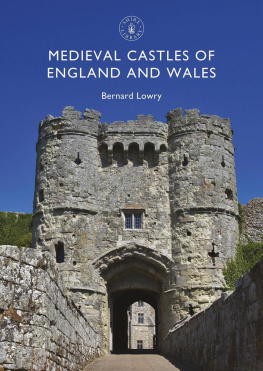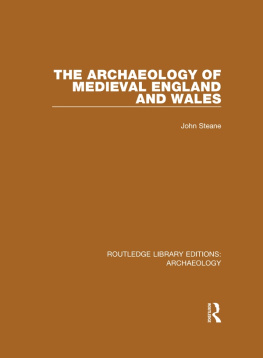Urban Culture in Medieval Wales
Urban Culture in Medieval Wales
Edited by
Helen Fulton
The Contributors, 2012
All rights reserved. No part of this book may be reproduced in any material form (including photocopying or storing it in any medium by electronic means and whether or not transiently or incidentally to some other use of this publication) without the written permission of the copyright owner except in accordance with the provisions of the Copyright, Designs and Patents Act 1988.Applications for the copyright owners written permission to reproduce any part of this publication should be addressed to The University of Wales Press, 10 Columbus Walk, Brigantine Place, Cardiff, CF10 4UP.
www.uwp.co.uk
British Library CIP Data
A catalogue record for this book is available from the British Library
ISBN978-0-7083-2351-9 (hardback)
978-0-7083-2503-2 (paperback)
e-ISBN978-1-78316-509-4
The rights of the Contributors to be identified as authors of this work have been asserted by them in accordance with sections 77 and 79 of the Copyright, Designs and Patents Act 1988.
Cover image: Thomas Smith, Chepstow (168090), oil. Private collection
Contents
Helen Fulton
Ralph A. Griffiths
Llinos B. Smith
Richard Suggett
Dafydd Johnston
Spencer Dimmock
Matthew Frank Stevens
Deborah Youngs
Dylan Foster Evans
Catherine McKenna
Helen Fulton
David Klausner
Peter Fleming
While this book was in the final stages of preparation, the funding base of the University of Wales Press was changed by the Welsh Government. I am extremely grateful to the Research Institute for Arts and Humanities at Swansea University, under the leadership of Professor Chris Williams, without whose financial support this book could not have been published.
Helen Fulton
University of York
Maps
Figures
Tables
Map 1 Main market towns and abbeys in medieval Wales
Map 2 Wales and England after 1284
Spencer Dimmock is an Honorary Associate of the College of Arts and Humanities at Swansea University. He has published numerous articles on late medieval Welsh and English economy and society. He is currently working on a book which will contribute to the debate concerning the transition from feudalism to capitalism and is provisionally entitled The Origin of Capitalism in England: A Defence of Robert Brenner , to be published by Brill in 201213.
Dylan Foster Evans is Senior Lecturer in the School of Welsh at Cardiff University. His main research area is late medieval poetry, and he has edited the work of the fifteenth-century poets Rhys Goch Eryri, Hywel Swrdwal and Ieuan ap Hywel Swrdwal. He is particularly interested in medieval aspects of postcolonialism, multiculturalism and ecocriticism.
Peter Fleming is Principal Lecturer in Medieval History at the University of the West of England, Bristol, and a Fellow of the Royal Historical Society. He works on later medieval urban history, with particular reference to Bristol and its region. He has published widely on medieval English history, but also has an interest in Welsh and Irish immigration into England in the long fifteenth century. His doctoral research was carried out at the University of Wales, Swansea.
Helen Fulton is Professor of Medieval Literature at the University of York. She has published widely on medieval Welsh literature and its social and political contexts. She is the editor of the Blackwell Companion to Arthurian Literature (2009) and the editor of the Transactions of the Honourable Society of Cymmrodorion .
Ralph Griffiths is Emeritus Professor of Medieval History, Swansea University, and formerly Chairman of the Royal Commission on the Ancient and Historical Monuments of Wales. He has published extensively on the history of Wales and England in the late Middle Ages; recent books include (with Roger S. Thomas) The Making of the Tudor Dynasty (1985), King and Country: England and Wales in the Fifteenth Century (1991) and The Fourteenth and Fifteenth Centuries in the Short Oxford History of the British Isles (2003). He is currently General Editor of The Gwent County History , five vols (20042012).
Dafydd Johnston has been Director of the University of Wales Centre for Advanced Welsh and Celtic Studies at Aberystwyth since 2008, and was formerly Professor of Welsh at Swansea University. He has published on all aspects of Welsh literature, and his research has focused on the poetry of the later Middle Ages, particularly the work of Dafydd ap Gwilym.
David Klausner is Professor of English and Medieval Studies at the University of Toronto. For the series Records of Early English Drama he has edited the volumes Herefordshire and Worcestershire , and Wales , and is presently editing the records of the North Riding of Yorkshire. He is Director of the Centre for Performance Studies in Early Theatre, and has recently edited The Pride of Life , Wisdom and The Castle of Perseverance .
Catherine McKenna is Margaret Brooks Robinson Professor of Celtic Languages and Literatures at Harvard University. Her research focuses on the medieval vernacular literatures of Wales and Ireland. She is among the editors of the Cyfres Beirdd y Tywysogion and author of The Medieval Welsh Religious Lyric: Poems of the Gogynfeirdd 11371282. She is interested in the history of popular religion saints cults, sacred places, and pilgrimage and is completing a book on the cult of Saint Brigit of Ireland from its origins to the present day.
Llinos Beverley Smith graduated in History from the University of London and, after postgraduate work there, was appointed to the Department of Welsh History (subsequently the Department of History and Welsh History) at Aberystwyth University, where she taught the history of medieval Wales and of medieval Europe until her retirement. She has published extensively on the social, economic and legal history of late medieval Wales. She contributed to Boroughs of Mediaeval Wales (ed. R. A. Griffiths) and a chapter on the towns of medieval Merioneth to The History of Merioneth, Volume II , which she co-edited with Professor J. Beverley Smith.
Matthew Frank Stevens holds a PhD from the University of Wales, aberystwyth (2005) in medieval social and economic history. In 20056 he was an Economic History Society postdoctoral fellow at the University of Oxford. Subsequently, he was a Research Officer at the Institute of Historical Research, University of London (200610) and Visiting Fellow of Nicolaus Copernicus University, Toru, Poland (2010), and is presently lecturer in medieval history at Swansea University. Matthew is the author of Urban Assimilation in Post-Conquest Wales: Ethnicity, Gender and Economy in Ruthin, 12821350 (Cardiff, 2010).
Richard Suggett has been a staff member of the Royal Commission since 1984 and is currently head of the emergency recording team. He has been a University of Wales Fellow, specializing in the social history of early modern Wales, and has taught at Coleg Harlech. His contributions to RCAHMWs publications include a study of John Nash the architect (1995; published jointly with the National Library of Wales) and Houses and History in the March of Wales (2005), a study of medieval houses in Radnorshire. His History of Witchcraft and Magic in Wales has recently been published (2008). He is an honorary fellow of the University of Wales Centre for Advanced Welsh and Celtic Studies, and has been a recipient of the Cambrian Archaeological Associations G. T. Clark prize.








